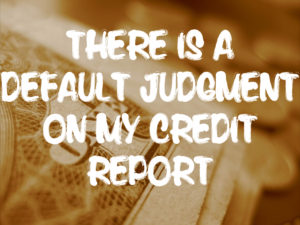By: Robert J. Nahoum
The Problem:
You have recently discovered that you had been sued by a debt collector and that judgment has been entered against you. The judgment shows up in the public records section of your credit report and is bringing down your credit score. What should you do?
The Rules:
A judgment on your credit report must be distinguished from the reporting of the debt itself from the creditor. When a judgment shows up in the public records section of your credit report it did not get there because the creditor reported it. The credit reporting agencies comb the court records themselves and report the public records. So, it is possible that the debt is being reported in two different ways; firstly it may be reported by the creditor as a delinquent account in collections; and secondly, it may be reported by the credit reporting agency as a judgment in the public records section of your credit report.
What You Should Do:
With a judgment entered against you it is advisable to resolve it quickly. A judgment allows the debt collector to freeze your banks accounts and garnishee your wages. Also, for up to 20 years the judgment can be a lien on any real property you own.
To resolve the judgment and protect your assets, many consumers choose to settle the debt. When doing so, be sure that the debt collector agrees to vacate the judgment when the settlement is paid rather than to satisfy it.  By vacating the judgment, the public records section of your credit report will no longer show that a judgment had ever been entered against you.
If you need help settling or defending a debt collection law suit, stopping harassing debt collectors or suing a debt collector, contact us today to see what we can do for you.
The Law Offices of Robert J. Nahoum, P.C
(845) 232-0202
www.nahoumlaw.com

